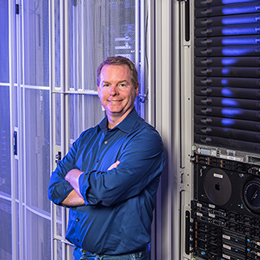March 31, 2021
Beocat continues to offer unparalleled computing access to researchers

Beocat, the high-performance computing cluster at the Kansas State University Institute for Computational Research, is marking 15 years of service excellence having provided more than 135 million central processing unit hours to 2,500+ active researchers.
Beocat also offers the ability for groups to store and share large datasets such as genomics, geology and veterinary medicine. With more than 3.3 petabytes of raw storage available, or 150 times the data stored in the Library of Congress, researchers can easily transfer huge amounts of data via Globus Connect to and from collaborators at other institutions.
Currently the largest academic supercomputer in Kansas, access is available to any educational researcher in the state and their collaborators. Supported by numerous NSF and university grants, Beocat acts as the central computing resource for multiple departments across campus.
Daniel Andresen, professor of computer science and Michelle Munson-Serban Simu Keystone research scholar, is director of the Institute for Computational Research, which oversees the campus research cluster, Beocat, and works to build the cyberinfrastructure foundation that allows K-State to successfully compete at the national level.
"Beocat is available to any academic researcher in Kansas and their partners under the statewide KanShare MOU," Andresen said. "Under current policy, heavy users 'buy in' through adding computational or personnel resources for the cluster. Their jobs, then, are given guaranteed priority on any contributed machines, and they have access to other resources in the cluster on an as-available basis."
Thus, projects can preserve a guaranteed base level of computation while utilizing the larger cluster for major computations. Users can also purchase archival data storage as needed. Office space for graduate students and faculty are controlled by the principal investigators and remain available for personnel use during the length of a grant. Computers for analyzing data, storing data, and writing reports and manuscripts are available to the researchers, and their support staff and graduate students.
Beocat staff provide tours demonstrating the value of K-State research, offering a high-tech look at its research facilities serving more than 3,000 participants including current and prospective students, funding agencies, faculty recruitment and outreach activities. Classes supported include topics such as bioinformatics, big data, cybersecurity, economics, chemistry and genetics.
For further information on accessing Beocat or Globus Connect services, contact Andresen at dan@k-state.edu.
